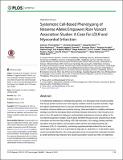Systematic Cell-Based Phenotyping of Missense Alleles Empowers Rare Variant Association Studies: A Case for LDLR and Myocardial Infarction
Author(s)
Thormaehlen, Aenne S.; Schuberth, Christian; Won, Hong-Hee; Blattmann, Peter; Joggerst-Thomalla, Brigitte; Theiss, Susanne; Asselta, Rosanna; Duga, Stefano; Merlini, Piera Angelica; Ardissino, Diego; Gabriel, Stacey B.; Rader, Daniel J.; Peloso, Gina M.; Pepperkok, Rainer; Kathiresan, Sekar; Runz, Heiko; Lander, Eric Steven; ... Show more Show less
Downloadthormaehlen-2015-systematic cell.pdf (1.222Mb)
PUBLISHER_CC
Publisher with Creative Commons License
Creative Commons Attribution
Terms of use
Metadata
Show full item recordAbstract
A fundamental challenge to contemporary genetics is to distinguish rare missense alleles that disrupt protein functions from the majority of alleles neutral on protein activities. High-throughput experimental tools to securely discriminate between disruptive and non-disruptive missense alleles are currently missing. Here we establish a scalable cell-based strategy to profile the biological effects and likely disease relevance of rare missense variants in vitro. We apply this strategy to systematically characterize missense alleles in the low-density lipoprotein receptor (LDLR) gene identified through exome sequencing of 3,235 individuals and exome-chip profiling of 39,186 individuals. Our strategy reliably identifies disruptive missense alleles, and disruptive-allele carriers have higher plasma LDL-cholesterol (LDL-C). Importantly, considering experimental data refined the risk of rare LDLR allele carriers from 4.5- to 25.3-fold for high LDL-C, and from 2.1- to 20-fold for early-onset myocardial infarction. Our study generates proof-of-concept that systematic functional variant profiling may empower rare variant-association studies by orders of magnitude.
Date issued
2015-02Department
Massachusetts Institute of Technology. Department of BiologyJournal
PLOS Genetics
Publisher
Public Library of Science
Citation
Thormaehlen, Aenne S., Christian Schuberth, Hong-Hee Won, Peter Blattmann, Brigitte Joggerst-Thomalla, Susanne Theiss, Rosanna Asselta, et al. “Systematic Cell-Based Phenotyping of Missense Alleles Empowers Rare Variant Association Studies: A Case for LDLR and Myocardial Infarction.” Edited by Chris Cotsapas. PLoS Genet 11, no. 2 (February 3, 2015): e1004855.
Version: Final published version
ISSN
1553-7404
1553-7390